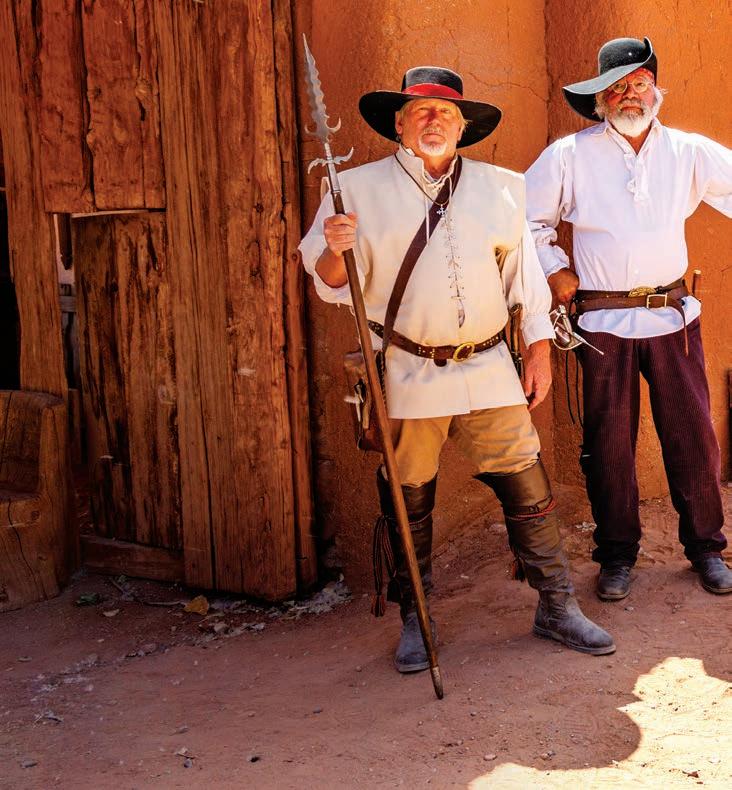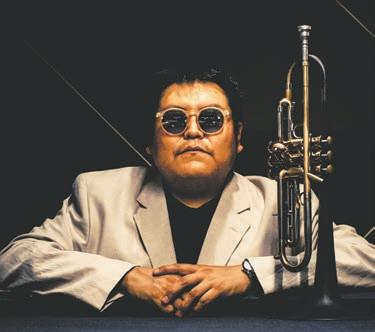
3 minute read
Get Your Hands On History
songs for everything. I hovered around the Diné spinning songs because they were social and they were meant to be shared.
Last year, your trio played in South Africa at the World of Music, Arts & Dance music festival and collaborated on the album Kindred Spirits A Navajo: South African Story, which includes the track “Grandma’s Song,” written and sung in Navajo by Alex Rose Holiday and featuring Nelisiwe Mtsweni, an Ndebele South African singer. Can you talk about that collaboration?
Advertisement
Open June–October
Seasonal Hours upcoming festivals
Wednesday–Sunday | 10am–4pm Hours may vary on festival weekends.
Santa Fe Wine Festival
July 1–2 | 12–6pm
Raise a Glass to the Ultimate Wine Experience in Santa Fe
Santa Fe Beer and Food Festival
August 5–6 | 12–6pm
Cheers to Local Brews, Great Eats, and Homegrown Hops
Santa Fe Renaissance Faire
September 16–17 | 10am–5pm
Journey Back in Time to the Majestic Kingdom of Golondrinas
All festival tickets must be purchased online in advance.
The Farmington-based Delbert Anderson Trio already had a busy year ahead when the New York Times ran a Feb. 24 story on Anderson’s quest to integrate traditional Navajo sound into jazz and funk. The day the story ran, Anderson tells SFR, he watched the traffic rise on his website and his inbox fill with hundreds of emails. The trio is now booked at venues and festivals this year, next year and well into 2025. “It’s been great,” Anderson (Diné) says, while admitting he hasn’t yet “had time to stop and enjoy” the success. “I think I’m kind of a little too deep into the work where I feel like, ‘let’s keep going,’” he says. Anderson, 36, whom the First People’s Fund named of 12 national 2023 Cultural Capital Fellows, is an artist-in-residence at the Institute of American Indian Arts through April 20, where he is researching the musical ensembles that grew out of Indigenous boarding schools. He’s also performing: Catch him playing trumpet at La Fonda’s Thursday night jams, and on April 15 at the Jean Cocteau Cinema (find his complete schedule at delbertanderson.com). The following interview has been edited for clarity and concision. (Julia Goldberg)
What are Navajo spinning songs and what role do they play in your music?
Navajo spinning songs are sort of social songs; the earlier ones almost teach etiquette. When I talked to the elders and asked if it would be okay to fuse some of these spinning songs with modern day jazz and funk, I thought they were going to say no, but they explained it like a tornado. They said, ‘whatever is around you gets caught up with you and, like a tornado, spits it out.’ They see the group I formed as tied to me and mixed up with culture and different traditions. This is the music that came out: this Delbert Anderson kind of sound. The elders said: ‘We had to do what we had to do during our time; we made songs about our time…this is your time.’ The common conception is you’re not supposed to share Native American music because it’s sacred, but there’s different
We had an album that had been kind of sitting around… [and] we were trying to find a rapper or an emcee to help us release the songs. The guy who was bringing us down said, ‘If you have the tracks, just send them down and we’ll start pairing it with different South African artists.’ When I started to research some of the artists, it started to make more and more sense. Neli started telling me the hardships of being a woman in South Africa, and she also said the Indigenous tribe she’s in is [in danger of] being wiped out and no one’s acknowledging it. It was the same stuff that’s going on here with most Indigenous tribes. I thought it would be great to get Neli and Alex on the same track because Alex is also an advocate for women, for culture and for youth. When I put them together, they were talking about the matriarch of Indigenous tribes and how it’s not a thing anymore, but back in the very old tradition of Diné people—and many other Indigenous tribes—the woman was thought of as the wise person or the leader. It was very brave thing for Neli to be singing about in her native language.
You loved jazz from a young age. Did you always know it had such a connection to Native Americans?
No, I didn’t. About three or four years ago is when I started to really dig in deep. I was only going to people I knew…to try to learn songs, but they’d always say, ‘man, there’s so many songs that we don’t know’ because our knowledge and our stories and songs are passed down [orally] and it makes it very difficult to find out how music was even just 50 years ago. But after I started finding elders from different areas, I was able to start hearing about…people like Jacob C Morgan [band director, boarding school staff member, former Navajo tribal chairman] and that’s when I really started to dive deep into the research. I feel like if more students heard about this history…it would lift their spirits because it’s definitely motivating for me to know there was a high level of success for Indigenous musicians, not only playing Native American music, but classical, folk songs, marching band. When you put it all together, it’s very amazing.







